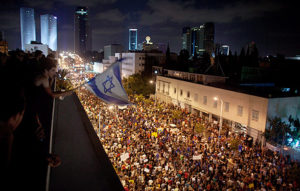
It is reported that at least 200,000 people gathered in Tel-Aviv Saturday, August 6th, protesting for social reforms.
Like most of the other uprisings going on in the Middle East and North Africa, Israel’s month long protests were started by the youth. One month ago, 26 year-old video-editor from Tel-Aviv, Daphni Leef, was informed that her rent was going to go up. Being a product of the 21st century, she did what any enraged 26 year old would do, she turned to Facebook. Daphni created an event on the social network calling on a few of her friends to join her in protest against the unmanageable rent increases that have been plaguing Israel for some time. They set up a mini tent village on one of Tel-Aviv’s main streets, Rothschild Street. Each day more people joined Daphni, until basically the entire country was standing (or should I say camping out) with her calling for reform. Though the protests started over the cost of housing, it has quickly evolved into a magnet for every social interest group that was dormant or previously unheard. There is no specific set of demands from the protesters, but some of the more pressing issues are stricter government regulation in the housing market and on food prices, and subsidies for the ultra-orthodox.
Over the last decade, Israelis have been largely complacent with how the government has handled the economy. Israel’s move away from socialist/communal tendencies, towards free market capitalism over the last 20 years has allowed the tiny nation to become a powerhouse in technology, pharmaceuticals, and agriculture. It has garnered respect worldwide for its entrepreneurial successes and innovation. However, it has also created some problems that the population has apparently had enough of. While no one is calling for outright socialism, average citizens want more government regulation to help control the costs of housing and food. The average Israeli makes somewhere between $25,000-$30,000 per year. The cost to rent a one-bedroom apartment in Tel-Aviv is about $1500 per month. That is $18,000 a year just on rent, not including utilities. That might be somewhat manageable (I’m being kind) for a 22 year old, but what about a family who needs a two or three-bedroom apartment? It has become clear from the protests, that these kinds of costs, in combination with extremely high taxes, are no longer sustainable. Israelis want the government to protect them against rich, profit minded landlords and building owners, as well as cut taxes.
Over the last two years the price of food in Israel has soared, cheese being the food of focus. Domestically made cottage cheese costs substantially more in Israel than it does abroad. This is due to the lack of competition, which paradoxically free market capitalism is supposed to incite. However, in this case, it hasn’t and Israelis want the government to do something about it. In a country that isn’t lacking in food availability, there is no reason for such high prices.

A significant portion of the population is fed up with unfair government subsidies given to Israel's ultra-orthodox community.
Finally, there is the age old issue of Israel’s ultra-orthodox. For years the government has been subsidizing their costs of living and giving them passes on mandatory army service; all in the name of Torah study. While there is nothing wrong with studying Torah, middle class Israelis are finally demanding that it not be at their expense. The middle class works its tail end off to be able to afford a decent apartment to house a family. The ultra-orthodox on the other hand, can easily have several kids with no worry about where they will live, the government will provide. Something doesn’t seem right about that. The tax dollars used on them could be going to improving the education system in Israel, which might be at an all-time low. It could be going to the soldiers who risk their lives for the defense of Israel. As of right now, soldiers make a measly stipend, somewhere between $100-$200 per month. The money spent on the ultra-orthodox could also simply just return to the pockets of Israel’s other citizens so that they can enjoy a higher standard of living. This could be the first baby step in closing the widening wealth gap between Israel’s rich and poor.
From what I have heard from people on the ground, there is a nostalgia emanating from the protesters. People want the emotions and the mentality of the country to return to the way they used to be. Israel used to be the place where Jews could wholeheartedly count on one another, where they didn’t need to worry about getting cheated. Israel was the homeland that provided for her people when no one else would. Heads of state used to retire to two-bedroom apartments in the Negev. While no one is under any illusion that physical and economic development changes the character of a country’s identity, Israelis feel they have been overly “Americanized.” Consumerism and profits have replaced community and sharing. Israel has lost its social safety net.
Unlike its Arab counterparts, the Israeli protests have not resulted in violence, nor should anyone expect them to. What is being called the “Jewish Spring,” is not a desire to totally upend the form of government or its leaders. It is simply a population demanding a better standard of living. While the people are being heard, there is a lack of defined leadership and identity. A panel of professors, economists, and influential figures has been put together to represent the protesters. But, I feel Israelis are still searching for their 2008 Barack Obama, someone new that can inspire the country and take the reigns. Hopefully that person will present themselves. In the meantime, Prime Minister Netanyahu, who

Is Bibi finally on the hot seat? He is hoping that he will at least be able to finish out his term as prime minister.
has openly acknowledged that he will need to change his economic policies, has put together a committee of inquiry to find answers for the protesters. This is less about helping the protesters and more about killing time in hopes that the movement loses steam and fades away. Don’t forget that the he is still battling the Palestinians over UN recognition in September. Some people have called for his resignation and the immediate dissolution of the government, both are unlikely. Look for elections to be called a year earlier than their original 2013 date, though. The Jewish Spring is long overdue and hopefully it will bring with it some real change Israelis can believe in.